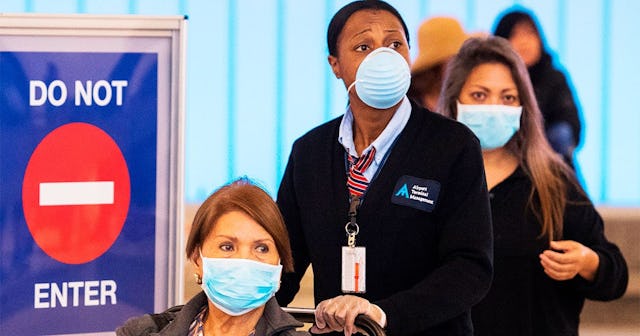The World Health Organization Officially Declares Coronavirus A Pandemic

The World Health Organization (WHO) has declared the novel coronavirus “a pandemic”
While much has been said in recent weeks of the growing concern over the coronavirus — also known as COVID-19 — today’s update from WHO leaves no doubt over just how serious health officials are taking the viral disease. On Wednesday, the organization’s Director-General Tedros Adhanom Ghebreyesus announced via media briefing that the novel coronavirus has officially been declared a pandemic.
“In the past two weeks, the number of cases of covid-19 outside China has increased 13-fold and the number of affected countries has tripled. There are now more than 118,000 cases in 114 countries, and 4,291 people have lost their lives,” Dr. Ghebreyesus said, continuing, “Thousands more are fighting for their lives in hospitals. In the days and weeks ahead, we expect to see the number of covid-19 cases, the number of deaths, and the number of affected countries climb even higher.”
Dr. Ghebreyesus went on to say that WHO has been assessing the outbreak around the clock, and they have become “deeply concerned both by the alarming levels of spread and severity, and by the alarming levels of inaction” displayed. Accordingly, WHO’s director-general explained, “We have therefore made the assessment that covid-19 can be characterized as a pandemic.”
The declaration, underscored Dr. Ghebreyesus, doesn’t change what WHO is doing to try to prepare countries for the virus — but it should perhaps make everyone else pay more attention to those measures. “We have never before seen a pandemic sparked by a coronavirus. And we have never before seen a pandemic that can be controlled at the same time. WHO has been in full response mode since we were notified for the first cases,” said Dr. Ghebreyesus. “We have called every day for countries to take urgent and aggressive action. We have rung the alarm bell loud and clear.”
However, WHO doesn’t want to incite panic. Rather, they seek to incite action.
Dr. Ghebreyesus offered statistics speaking to how the coronavirus has impacted communities so far. Of the 118,000 reported cases, more than 90 percent have been in just four countries. So far, 81 countries haven’t reported any cases, and 57 countries have reported 10 cases or less.
“We cannot say this loudly enough, or clearly enough, or often enough; all countries can still change the course of this pandemic. If countries detect, test, treat, trace, and mobilize their people in the response, those with a handful of covid-19 cases can prevent those cases from becoming clusters, and those clusters becoming community transmission. Even those countries with community transmission or large clusters can turn the tide on this. Several countries have demonstrated that the virus can be suppressed and controlled,” emphasized Dr. Ghebreyesus.
The challenge now, he says, is not whether countries can suppress coronavirus’ spread, but if they will — whether it’s a matter of a lack of capacity, resources or resolve. At this point, WHO is calling on countries to mobilize those in the healthcare industry to adequately prepare for the influx of coronavirus patients. Preparedness, readiness, and response will play a large role in how the coronavirus pandemic plays out.
As for the rest of us, the CDC continues to recommend washing hands with soap and water for at least 20 seconds or using a hand sanitizer in the absence of sink access. And WHO says people should only resort to wearing face masks if they’re sick or caring for someone who is.
This article was originally published on